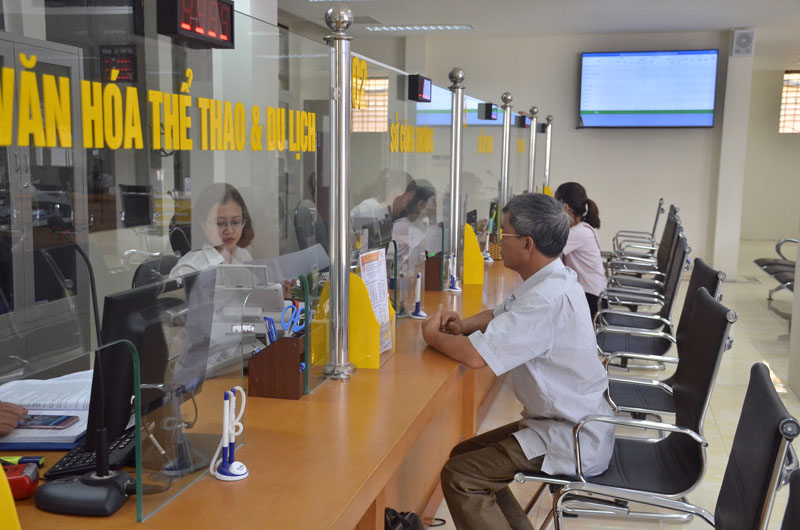
(HBO) – All documents handled by departments, agencies, cities and districts in Hoa Binh province have been computerized, according to the provincial Department of Information and Communications.
All
departments and agencies at the provincial and district levels have used
electronic signatures to issue documents online.
The
application of information-technology in e-government building in Hoa Binh
province has produced many positive results.

The public
administrative services centre houses all offices involved in handling
administrative procedures, making it easier for people and businesses to access
the services.
Nguyen
Minh Thanh, deputy head of the IT bureau under the Department of Information
and Communications said departments, agencies and People’s Committees of cities
and districts in Hoa Binh have stepped up IT application in the management
work, contributing to e-government building and administrative reform.
As
of March 2019, up to 80 percent of information and instructions of provincial leaders
as well as officials of departments, agencies and districts had been posted on the
websites of these units. Besides, 90 percent of internal documents of agencies
have been exchanged online, eradicating the need for hard copies, while 90
percent of official documents of State agencies have been exchanged online in
parallel with hard copies. At the same time, 40 percent of documents of State
agencies are sent and received only online without hard copies.
The
province’s document management system has been connected with the national
system, allowing the sending and reception of documents from the central to
communal levels.
"This
contributes to modernizing the provincial administrative system and improving
the local ICT index and the provincial competiveness Index (PCI),” Thanh said.
"It has also helped change the working style of local leaders and
officials, as well as businesses towards higher efficiency,” he added.
In the spirit of "Party members go first, the people follow”, all households of Party members in the Doan Ket sub-region in Da Bac town, Da Bac district, voluntarily removed gates and fences, and donated land when the road expansion project passed through their properties. Inspired by their example, 68 households in the sub-region quickly followed suit, contributing over 1,400 sq.m of residential and perennial cropland to widen the main road through the residential area. The exemplary role of Party members in Doan Ket stands as a shining example of studying and following President Ho Chi Minh’s thought, morality, and lifestyle.
The Hoa Binh provincial People's Committee held a monthly meeting on May 29 to assess the implementation of socio-economic development tasks in the first six months of 2025, the progress of key projects, and some other important issues.
During his lifetime, President Ho Chi Minh always expressed his deep affection and special concern for children and youth. He once emphasized: "Caring for and educating children well is the responsibility of the entire Party and the entire people”; "First of all, the family (i.e. grandparents, parents, siblings) must do this job well”. "the Party Committees…, the Children’s Committee, the Youth Union, the education sector, and all related organizations must have specific plans to ensure children grow healthier and more progressive”. His teachings has been remaining valuable and serving as the guiding principles in the work of protecting, caring for, and educating children. In line with this ideology, Hoa Binh Province has continuously been prioritizing and investing resources in the well-being of children in recent years.
Mr. Nguyen Phi Long, the alternate Member of the Party Central Committee and Secretary of the Provincial Party Committee chaired the meeting of the Standing Committee of the Provincial Party Committee to provide opinions on several investment projects within the province. There was the attendance of Ms. Bui Thi Minh, the Permanent Deputy Secretary of the Provincial Party Committee and Chairwoman of the Provincial People’s Council; Mr. Bui Đuc Hinh, the Deputy Secretary of the Provincial Party Committee and Chairman of the Provincial People’s Committee and other members of the Standing Committee; the leaders from other departments, agencies, and some localities.
The Standing Board of the Vietnam Fatherland Front (VFF) Committee of Hoa Binh province held a meeting on May 28 to honour outstanding village elders, village heads, and reputable individuals from local ethnic minority and religious communities.
In mid-May, the provincial Museum organised an exhibition named "Duoi la co Dang Cong san Viet Nam quang vinh” (Under the flag of the glorious Communist Party of Vietnam). This meaningful activity took place in the joyful atmosphere to celebrate the country's major holidays and the Party congresses at all levels for the 2025-2030 term, towards the 14th National Party Congress.



